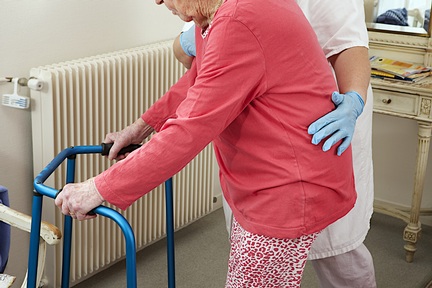ADASS boss wants care home staff to get priority testing, PPE and full sick pay to stop COVID-19 rise
The chief of the Association of Directors of Adult Social Care has called for full sick pay for care staff and for care homes to be treated as a priority when it comes to testing and PPE, in the wake of a warning from the government that care homes in England are seeing a rise in COVID-19 cases.

The Department for Health and Social Care has written to all care providers in England warning them that care homes are seeing a rise in COVID-19 cases.
The letter reveals that last week Public Health England (PHE) saw an increase in notifications of COVID-19 cases in care homes as well as a rise in positive results from testing data.
The number of care homes affected last week was 43, which equates to 0.2 per cent of care homes. There are currently 17,743 care homes in the UK.
In response to the letter, James Bullion, executive director of Adult Social Services, Norfolk and president of Adass (Association of Directors of Adult Social Services) tweeted: 'It's essential to protect social care - people and workers. So make social care the priority for testing, for PPE, and ensure staff are paid to work in one place with full sick pay. It'll be no good publishing a winter plan without resources for councils to cope.'
Due to infections rising in certain areas, councils in Newcastle, Gateshead and Sunderland have already closed all of their care homes to visitors, just weeks after families were allowed in to see residents.
Stuart Miller, director of Adult Social Care Delivery at the Department of Health and Social Care, said in the letter: ‘Currently, the infections are mainly affecting the workforce but clearly there is a risk the virus will spread to care home residents, or to other parts of the care sector.
‘Unfortunately, in some care homes with recent outbreaks, this does appear to have occurred, with residents also becoming infected. I am writing at the earliest opportunity, so we can work in partnership to prevent further spread of the disease.’
‘The rapid flow of data and information, to and from care providers, is vital to this effort.’
He added: ‘We want to express our heartfelt thanks for your enormous efforts, care and vigilance to date. It is precisely these qualities that will stand us in good stead throughout the autumn and winter months.’
The DHSC will soon be publishing its Adult Social Care Winter Plan setting out the support and resources it will make available nationally.
Mr Miller highlighted the ‘importance of regular testing and consistent use of PPE’ saying ‘these are two of the most effective ways to stop the virus in its tracks’.
He also urged providers to ensure they are putting in place best practice infection prevention control practices such as restricting staff movement, set out in the care homes guidance and to test all care home staff every week.
He said: ‘We recognise that rollout of the repeat testing programme for care homes was unfortunately delayed. However, tests have now been delivered to all care homes for older people who registered for regular testing and the portal is now also open for care homes for working age adults to register for repeat testing.’
He added: ‘At present, we have no significant backlog and are able to send out test kits within several days of orders being placed. We encourage care homes that have not yet registered for repeat testing to do so.’
Any member of staff who develops symptoms should immediately self isolate and order a test, said the DHSC.
Mr Miller also called on providers to make sure staff are following the PHE guidance relating to PPE.
Latest News
 29-Jul-24
Dementia Bus gives carehome.co.uk staff insight into life with dementia
29-Jul-24
Dementia Bus gives carehome.co.uk staff insight into life with dementia
 01-Mar-24
Find out the top care homes in 2024
01-Mar-24
Find out the top care homes in 2024
 21-Mar-23
UK's top care homes in 2023 revealed
21-Mar-23
UK's top care homes in 2023 revealed
 03-Jan-23
carehome.co.uk launches free care helpline
03-Jan-23
carehome.co.uk launches free care helpline
 13-Dec-22
5 mins with Emily Whitehurst, chief operating officer for Constantia Healthcare
13-Dec-22
5 mins with Emily Whitehurst, chief operating officer for Constantia Healthcare